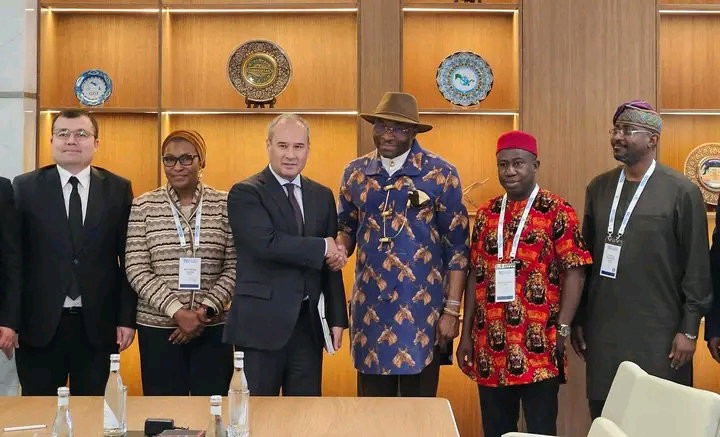Tinubu's Strategic Reloading for the 2027 Presidential Election
......... 𝒂𝒔 𝒕𝒉𝒆 𝒐𝒑𝒑𝒐𝒔𝒊𝒕𝒊𝒐𝒏 𝒄𝒐𝒂𝒍𝒊𝒕𝒊𝒐𝒏 𝒊𝒔 𝒔𝒆𝒕 𝒕𝒐 𝒄𝒐𝒍𝒍𝒂𝒑𝒔𝒆 𝒘𝒊𝒕𝒉𝒐𝒖𝒕 𝒂 𝒄𝒍𝒆𝒂𝒓𝒍𝒚 𝒅𝒆𝒇𝒊𝒏𝒆𝒅 𝒛𝒐𝒏𝒊𝒏𝒈 𝒂𝒓𝒓𝒂𝒏𝒈𝒆𝒎𝒆𝒏𝒕
As the dust settles from Bola Ahmed Tinubu’s 2023 presidential campaign in Nigeria, it becomes evident that this political tactician is far from finished.
Silently preparing for the 2027 elections, Tinubu’s strategies are evolving to secure a stronger hold on the political landscape of Nigeria.
With a combination of youth engagement, regional alliances, internal restructuring, religious outreach, and an innovative media strategy, Tinubu aims to outmaneuver his political opponents.
One of Tinubu's key strategies revolves around engaging the younger demographic.
He is actively rebranding the All Progressives Congress (APC) to resonate with Gen Z values.
This includes offering youth-focused policies that promise jobs, loans, and advancements in the digital economy.
By integrating street slang and a tech-savvy approach into the party’s communications, Tinubu is successfully cloaking traditional politics in a modern guise, thereby ensuring that opposition parties entrenched in outdated methods are left behind in the race to engage new voters.
Moreover, Tinubu is focusing on the South-South region, an area pivotal for any political party in Nigeria due to its oil wealth.
By strategically positioning loyal supporters in key roles and facilitating federal projects in states like Rivers and Akwa Ibom, Tinubu seeks to build an alliance that could challenge the long-standing dominance of the Peoples Democratic Party (PDP).
This calculated approach is indicative of his commitment to expand his party's influence in regions previously considered as strongholds for the opposition parties.
Internally, Tinubu is conducting a significant overhaul of the APC.
By removing ineffective leaders and replacing them with younger, more media-savvy representatives, he is crafting a streamlined and agile party that can adapt to changing political currents.
This internal purge ensures that by the time the next election cycle begins, the APC will be populated by individuals loyal to Tinubu's vision and capable of engaging effectively with the electorate.
Another critical aspect of Tinubu's strategy is his aim to mend the fractures caused by the Muslim-Muslim ticket in the 2023 elections.
Recognizing the concerns this raised among Christian voters, he is proactively engaging in outreach to major Christian groups and promoting interfaith initiatives.
This move is designed to neutralize religious sentiments that may have previously hindered his political ambitions.
Finally, Tinubu's media strategy is evolving to reflect contemporary communication methods.
Leveraging platforms such as TikTok, Threads, and Instagram, he is establishing a fun and relatable persona that can connect with younger voters.
His digital campaigns are becoming increasingly sophisticated, focusing on narratives that blend political content with cultural relevance, thereby embedding his message within the daily lives of the electorate.
Let me conclude by saying that President Tinubu's preparation for the 2027 presidential election underscores a profound understanding of Nigeria's political dynamics.
His innovative strategies, coupled with a deep engagement with the youth and careful manipulation of regional and religious sentiments, position him advantageously for the next electoral battle.
If the opposition fails to adapt to these evolving tactics, they may find themselves outmaneuvered in what promises to be an intense political contest.
References
[1] A. N. Adebayo, "Youth Engagement in Nigerian Politics: The Role of Social Media," Journal of Political Communication, vol. 28, no. 3, pp. 245-261, 2023.
[2] S. O. Iwunor, "Religious Dynamics in Nigerian Politics: Addressing the Muslim-Muslim Ticket Controversy," Nigerian Political Review, vol. 15, no. 1, pp. 112-130, 2023.
[3] F. A. Uche, "The Youth and Political Rebranding: Exploring APC’s Strategies," Journal of African Studies, vol. 41, no. 2, pp. 105-118, 2023.
[4] M. J. Okafor, "Media Influence in Nigerian Politics: The Shift to Digital Platforms," African Journal of Mass Communication, vol. 30, no. 4, pp. 98-115, 2023.
[5] K. A. Nwosu, "Strategic Political Alliances in Nigerian Elections: The Case of the South-South Region," Nigerian Journal of Political Science, vol. 12, no. 2, pp. 177-192, 2023.
𝓘𝔂𝓴𝓮 𝓜𝓫𝓪
S.ʟ.ᴀ Dᴇᴘᴜᴛʏ Sᴘᴇᴀᴋᴇʀ H.ᴏ.ʀ





𝔻𝕠𝕖𝕤 𝕚𝕥 𝕔𝕙𝕒𝕟𝕘𝕖 𝕥𝕙𝕖 𝕙𝕦𝕟𝕘𝕖𝕣 𝕚𝕟 𝕥𝕙𝕖 𝕝𝕒𝕟𝕕 𝕙𝕖 𝕔𝕣𝕖𝕒𝕥𝕖𝕕 𝕥𝕙𝕣𝕠𝕦𝕘𝕙 𝕙𝕚𝕤 𝕨𝕚𝕔𝕜𝕖𝕕 𝕡𝕠𝕝𝕚𝕔𝕚𝕖𝕤.
ردحذف